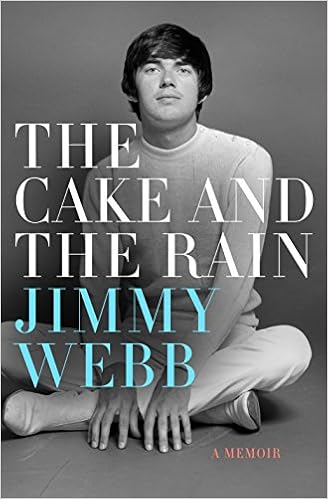|
Jimmy Webb, The Cake & The Rain: A Memoir (St. Martin's Press, 2017) Sex, drugs and rock 'n' roll. Not necessarily in that order, and in varying amounts of each. Plus, cars: lots of fast, sporty cars. Cars that no one else would drive or could afford. And a glider plane, too. These were the key elements in Jimmy Webb's life in the late 1960s and early '70s, as his success and fame turned him into "America's Songwriter." He has been prolific with the pen and remains best known for a few key songs: "By the Time I Get to Phoenix," "Wichita Lineman," "Galveston," "Up, Up & Away" and of course, as hinted in the title, "MacArthur Park." Now we can hear how these melodies and lyrics came about, and what was going on behind the scenes. And, yes, you will learn that a lot was happening backstage.
The reader's first reaction to Jimmy's memories must be: "How can all of this stuff happen to one single person?" Then: "How can he keep running into all of these famous musicians?" And, too: "How can one person survive after taking so many drugs, so often, for so long?" Yes, Jimmy has led an amazing life and has met amazing people. And we can't accuse him of name-dropping, either. He's just remembering events as they happened; and naturally, we recognize the names of the people he was associating and working with back then. Paul McCartney calls him on the phone. Of course, he does. Joni Mitchell, Linda Ronstadt, J.D. Souther, James Taylor and other notables perch outside his house one December day in 1973 and sing carols in four-part harmony. Of course, they do. Harry Nilsson calls in the middle of the night and says that he and John Lennon are in a jam and need help. Twice. Well, sure. We should expect nothing less. Jimmy Webb was in the right places at the right times to do and become exactly what he is: a supremely talented singer-songwriter and arranger, with many connections in the music industry, past and present. Even while telling stories from his past, he reveals his tendency to pen poetic prose. His style makes for good reading. The more recent sections provide occasional hints at the success of the masterpiece "MacArthur Park," but we don't reach its actual creation until two-thirds of the way through the book. One day in 1967, Jimmy is asked by producer Bones Howe to write a "climactic tour de force" as a finale on the newest album by the Association. He requests that it be written in classical music style, with various movements and solos, requiring a full symphony orchestra. Can he do it? And Jimmy says yes. He wants to write a "magnum opus" for a former love anyway, recounting their "sad last night at MacArthur Park" in Los Angeles. He calls on his inspirational memories and enhances them with his talent and time at his piano. Three days later, he has a manuscript. When he plays it for the Association, they turn it down. Turn it down! Fortunately, Irish actor and singer Richard Harris loves it enough to record it. And even then, a fair amount of challenges come with the production. If you haven't heard "MacArthur Park" in a good long while, then you should call it up online. Look for the Richard Harris original. The composition will take you back to the late 1960s like nothing else can. I also recommend watching the 2014 Late Show with David Letterman performance with Paul Shaffer, Will Lee, the CBS Orchestra and Jimmy Webb on organ and piano. It's just as impressive. Otherwise, Jimmy doesn't spend a lot of time explaining how he writes or what his inspirations are -- except, of course, as reactions or obsessions with complicated or lost loves. We get the impression that he has even more stories to share, especially since this book ends in 1973. He hints in the acknowledgements that a "book two" will come. We will be lucky, if it does. He is lucky that he has a second book to write. This one concludes with huge lists of songs, awards, performers and projects. How can a single person acquire so many credits? The Cake & the Rain is highly recommended for anyone who considers themselves to a fan of 1960s-70s music. If you lived through this era and remember most of it, this book is for you. For others: if you love music, and you know only bits and pieces about the American music scene in the '60s, then you too should read this book. It turns into a "Who's Who" pretty quickly. Creative folks like fellow writers and songwriters may very well find common ground here, too. It's always interesting to learn how other people create. Now at age 73, Jimmy Webb continues to perform in small venues and to share some of his personal musical history. Maybe you'll be lucky enough to hear him in concert, too. Read the book first, before you go. [ visit Jimmy Webb's website ] 

|
 Rambles.NET book review by Corinne H. Smith 11 April 2020 Agree? Disagree? Send us your opinions!  



 |

